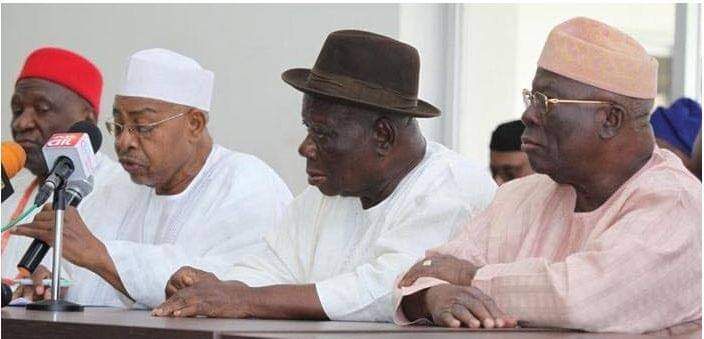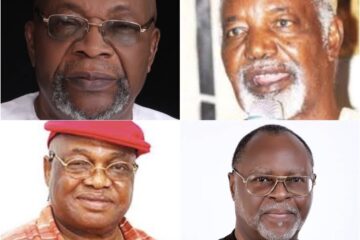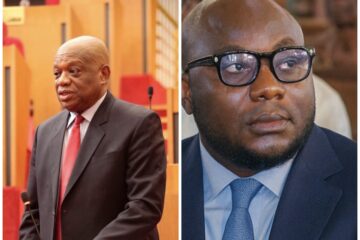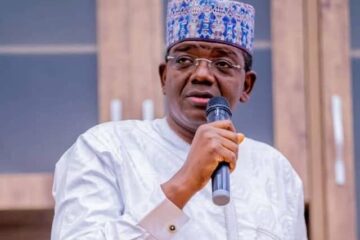TODAY, I celebrate two giants among men: Chief Ayo Adebanjo, leader of Afenifere, the Yoruba socio-cultural and political group; and Chief Edwin Kiagbodo Clark, Ijaw leader and President of the Pan Niger Delta Forum, PANDEF. These are four of our oldest surviving founding fathers who share certain characteristics.
They are nonagenarians, and I list them in their ages’ descending order: Alhaji Tanko Yakassai, 97; Chief Mbazulike Amechi, 96; Chief Clark, 95 and Chief Adebanjo, 94.
In spite of their ages, these living ancestors are very eloquent, blessed white photographic memories and are strong regional leaders and advocates. They are still active in Nigeria’s socio-political affairs. I celebrate Chief Clark, (EK) and Chief Adebanjo because they are the last Southern Elders and Leaders still standing in the region’s defence. Adebanjo leads the Afenifere, where leadership is transferred to its eldest member at the demise of an incumbent.
EK simply announced himself as Ijaw Leader during the Warri wars of the late 1990s and 2000s. He justified that moniker by his ability to provide a central umbrella for the amorphous Ijaw groups, agitators, militants and to some extent, politicians, from 1998 till date. He stands as the central leadership figure in the Niger Delta with its mushrooms of firmly entrenched “ethnic nationalities” formed mainly as elite platforms to benefit from the region’s oil wealth.
The orthodox float of the Ijaw political mindset is that the old Rivers State was created for their ethnic group. They also claim that the Niger Delta bloc is their reward by the Fulani-led North for their alliances which eventually ended Igbo control of the Eastern Region. Niger Delta is an Ijaw booty, at least, so they want to believe. That was why Clark fought dirty when former Rivers State Governor, Dr. Peter Odili, was looking good to succeed President Olusegun Obasanjo.
EK said that the South-South’s clamour for president was meant for the “real” Minorities not for Igbo like Odili. Meanwhile, Odili was distancing himself from his Igbo identity. He called himself a “Rivers man” as if Rivers State was a tribe.
Even when Obasanjo gave the presidential ticket to the late Umaru Yar’Adua, EK continued to fight for the VP slot for his Ijaw ethnic group until Obasanjo picked Goodluck Jonathan as Yar’Adua’s running mate. If not for EK, Odili could have been president in place of Jonathan.
With Jonathan’s emergence, the Igbo nation still met in Enugu and voluntarily forwent their right to run for president in 2011 in order to support Jonathan whom the North (EK’s traditional allies) wanted out at all cost. Indeed, this same Atiku Abubakar was chosen by the North to snatch the presidency from Jonathan in the 2011 election. EK continued to crave the North’s support because, according to him, Ndi Igbo “have no electoral value”. The Ohanaeze Ndi Igbo ignored these insults and asked Igbo voters to support Jonathan because he was “nearer home” than the Northern candidates. It was also felt that supporting Jonathan could help in fostering amity between the Igbo and their Minority neighbours.
In the end, the Igbo nation gave Jonathan the highest quantum of votes that enabled him to defeat the North’s candidates – Atiku at the PDP primaries and Buhari/Nuhu Ribadu at the presidential election. Www.electoralgeography.com listed the percentage of votes given to Jonathan in the five South East States in 2011 as follows: Abia: 98.96%; Anambra: 98.96%; Enugu, 98.54%; Imo, 97.98% and Ebonyi, 95.97%. Clearly, Ndi Igbo swung the vote for Jonathan. In return, Jonathan opened his arms and took Ndi Igbo into his government. In an unprecedented move in Nigeria’s history, President Jonathan asked Ohanaeze to give him three names from which to pick his Secretary to the Government of the Federation, SGF. Jonathan eventually chose one of the nominees, Senator Anyim Pius Anyim.
Jonathan also broke bounds and brought out the Nigerian Army to give Dim Chukwuemeka Odumegwu Ojukwu a Five Star burial fit only for a president. During the burial at Nnewi, the who-is-who of the Ijaw nation descended in their numbers. Ijaw leaders read speeches which underlined the positive sides of the historical ties between the Igbo and Ijaw which were hitherto hidden under acrimony.
Not only that, Jonathan appointed General Azubuike Ihejirika as Chief of Army Staff. It was unthinkable, since the civil war, to give such a job to an Igbo officer. What further annoyed many people in the North was that Ihejirika went after Boko Haram without mercy. He was on the verge of wiping them out when some Northern leaders accused Jonathan of declaring “war” on the North. Jonathan was forced to remove and retire Ihejirika. Jonathan paid dearly because Boko Haram helped chuck him out in 2015.
Jonathan was seen as an “Igbo president”. The hatred reserved for the Igbo was transferred to Jonathan and vice versa. But the Igbo stood firmly behind him even in his defeat until a few months ago when the same people who drove him out wanted to use him for their selfish ends in 2023. One of the fallouts of the Igbos’ deliberate adoption of Jonathan from 2010 is that the hostility between Igbo and Ijaw has gone down considerably.
This has also reflected in the new atmosphere of EK’s friendliness towards the Igbo. South-East and South-South are now seen as twins in Nigerian politics.
Chief E.K. Clark has been at the forefront of the agitation for the presidency to return to the South after Muhammadu Buhari’s eight years. This time, he is not doing emi l’okan. He is firmly standing for equity and justice. The South-East supported the South-West, North- West and South-South when the PDP zoned the presidency to them. Now that it is their turn, the PDP reneges. EK is standing up for the South-East to be given their due.




